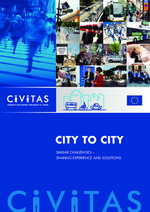
Sakarya (Türkiye)
Sakarya is a city of 390,150 inhabitants, located in the Marmara region on the Black Sea coast. The city is divided by the river Sakarya, which creates a web of estuaries in the province of the same name. The city pays more and more attention to sustainable transport measures...
Its location close to Istanbul has resulted in Sakarya being industrially well developed. There are many factories in and around the city, including the Toyota and Hyundai car plants, the Good Year tyre factory, the Iveco and Otokar bus factories, the Hyundai Eurotem train manufacturer and a military vehicles factory.
The city’s modal split, based on daily urban trips in Sakarya, is approximately 50 percent public transport, 40 percent private cars, 5 percent cycling, and 5 percent pedestrians. Public transport in Sakarya comprises buses, midi-buses, minibuses and a share taxi service.
At present, Sakarya does not have a sustainable transport management policy. However, several studies have been carried out into various aspects of sustainability, including a car park (pricing) policy; park and ride initiatives; the creation of pedestrian zones; and the promotion of public transport use and cycling.
Innovative measures include the implementation of an intelligent traffic light signalling system. In the field of clean vehicles, the city has introduced 20 energy efficient vehicles that run on Euro 4 fuels.
The main challenges faced by the city authorities are a limited budget and a lack of qualified personnel. Its aspirational targets are to create sound technical solutions for sustainable mobility and raise public demand for sustainable measures. However, progress is challenged by the difficulties associated with motivating citizens to use collective transport modes, cycle or walk rather than use private cars. At the same time, local politicians and decision makers require continuous support to actually implement sustainable transport initiatives.
In the implementation of the above activities, the city of Sakarya cooperates with university technical departments, other central government institutions (highway and railway authorities, department of environment, police department etc), private companies, the local press, and other stakeholders such as associations of private operators of public transport.
Summary finalized: August 2010







